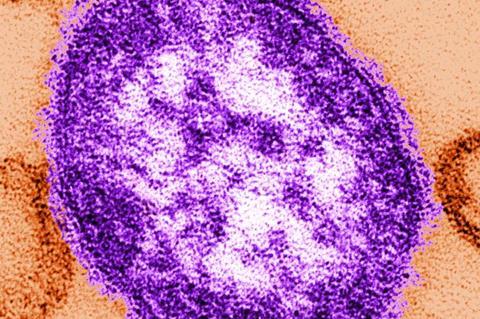Doctors in London have been urged to be vigilant for symptoms of measles as researchers warn that the risk of outbreaks in the city is significant.
The steps taken by one London hospital to prevent an outbreak of measles will be detailed at this year’s European Congress of Clinical Microbiology & Infectious Diseases (ECCMID) in Copenhagen, Denmark (15-18 April).

Measles, which is highly contagious, can cause serious and potentially life-threating illness and complications including blindness, encephalitis (swelling of the brain) and pneumonia. Pregnant women, infants and severely immunocompromised individuals are at highest risk.
Contracted when pregnant, it can cause low birth weight babies, premature birth, miscarriage or stillbirth.
Recent incident
It usually starts with cold-like symptoms, followed by a rash a few days later. The MMR vaccine can prevent measles, as well as mumps and rubella (German measles). However, uptake of the first dose of the vaccine has fallen to 74.2% in London, significantly below the World Health Organization target of 95%.
Taken together with a very low incidence of measles in London during the COVID-19, the risk of outbreaks is significant.
At this year’s ECCMID, Dr David Harrington, of Barts Health NHS Trust, London, describes the rapid action taken to contain a potential outbreak of the disease.
A 28-year-old woman attended A&E at the Royal London Hospital (part of Barts Health NHS Trust) in February 2023 with typical early symptoms of measles. PCR testing of a cheek swab subsequently confirmed she had the virus.
The patient was in the waiting room for eight hours before being isolated. 103 patient contacts and eight staff contacts were identified. Clinical notes were reviewed for patient contacts at highest risk and five patients with severe immunosuppression and four pregnant patients were identified.
Testing for immunity
Stored blood samples were available for all nine of these patients and tested for IgG measles antibodies. A positive result indicates immunity to measles due to vaccination or past infection.
All of the pregnant patients were confirmed immune and reassured.
One patient with severe immunosuppression (a kidney transplant patient) was not immune and was given intravenous immunoglobulin (IVIG) as post-exposure prophylaxis.
Another patient with severe immunosuppression (on high dose prednisolone and ciclosporin for inflammatory disease) reported having received two doses of MMR but found to be non-immune and IVIG was administered.
All staff contacts were confirmed immune.
Contact tracing
The contact tracing started as soon as measles was suspected and, along with the other steps, including identifying the high-risk contacts, performing the IgG tests and administering the IVIG, took two days to complete.
None of the patient or staff contacts are known to have developed measles.
The 28-year-old woman returned home after medical assessment and investigations. She had not had the MMR vaccine.
Dr Harrington says: “We are already seeing signs that measles may be reemerging in London. At Barts Health NHS Trust, which serves a large area of East London, we had five confirmed unrelated cases in February of this year. These were the first to be detected by our labs since early 2020 and, given the low vaccine uptake in London, the risk of outbreaks is significant.
Signs of measles
“Clinicians should be alert to the signs of measles and triage and isolate suspected cases early. This will limit spread in healthcare environments and reduce exposure to those at high risk of severe outcomes.
“Many front-line clinicians won’t have seen measles for several years, however, and so good education and training and collaboration between public health and infection specialists with those in primary and emergency care is key.
“When exposure does occur, a risk assessment must be carried out immediately. Rigorous contact tracing is also essential.
“It is important to remember that the MMR vaccine is highly effective in preventing measles with providing lifelong protection and I would urge parents to ensure their children are up to date with their vaccines.
“If they haven’t been vaccinated yet, or are not up-to-date with their vaccinations, please ask your GP surgery for a vaccination appointment.”







No comments yet